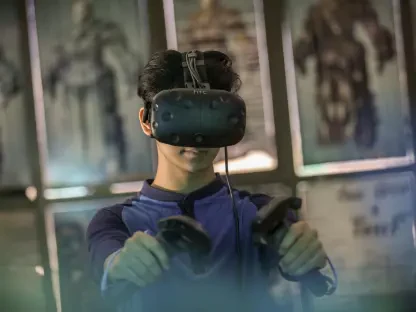Colleges have traditionally been seen as bastions of free inquiry, discourse, and debate. However, the increasing polarization in society has seeped into these institutions, turning campuses into microcosms of wider societal conflicts. Marjorie Hass, president of the Council of Independent Colleges, pointed out that even seemingly apolitical decisions like accepting SAT scores or the content taught in science departments have become politically charged. This polarization puts higher education leaders in challenging positions, balancing their duty to uphold academic freedom while navigating contentious issues that reflect larger societal divides. The ability to maintain open dialogue on campuses amid this polarization is indeed becoming an intricate balancing act.
A panel at the annual conference of the American Association of Colleges and Universities brought together college presidents and higher education experts to discuss methods for navigating these turbulent waters while upholding a culture of free speech. Lori White, president of DePauw University in Indiana, highlighted the importance of clearly articulating an institution’s values and demonstrating them through practice. This clarity helps in making informed decisions during conflict, both on campus and externally. The closer an issue aligns with a college’s mission, the more moral authority leaders possess to address it. At the core, establishing and communicating these values serves as a guiding compass for educational institutions in times of crisis.
The Challenge of Incoming Students
A consensus among the panelists was that incoming students are increasingly ill-equipped to handle conflict productively. The COVID-19 pandemic and the subsequent shift to remote learning exacerbated this issue by depriving students of crucial in-person interactions during their formative years. Jonathan Alger, president of American University in Washington, D.C., observed that students now find themselves in diverse environments such as residence halls and classrooms without the necessary skills to engage with varying perspectives and viewpoints. The lack of earlier socialization means that students encounter greater difficulty navigating disagreements and differences constructively.
Alger emphasized that the skills required for civil discourse and debate should be taught, even though they are often not mandated by state and regulatory agencies. Institutions should offer education in dialogue and active listening and partner with K-12 schools to instill these skills early. Students themselves show a strong desire to learn critical thinking and civil discourse skills, Hass noted. She stressed that while there has been considerable focus on freedom of speech, there is a need to balance it with the freedom of thought, moving beyond the concept of saying anything without regard for productive conversation. The integration of these teachings into the curriculum helps bridge the gap between academic learning and practical interpersonal skills.
Teaching Civil Discourse
Alger’s previous experience as president of James Madison University included teaching a leadership seminar where students were assigned to debate positions they might not personally agree with. This method helped students understand that arguments are not necessarily personal attacks and encouraged them to focus on crafting the best possible arguments regardless of personal beliefs. Engaging in these exercises teaches students to separate their identity from their stance on issues, fostering a more mature and open-minded approach to debates. Alger highlighted that such methodologies are instrumental in preparing students for the multifaceted, often polarized discussions they will face in both academic and professional settings.
Panelists also highlighted the importance of community and relationship-building as the foundation for constructive conversations. Lori White pointed out that relationships allow for disagreement without it being perceived as an attack on personal dignity. However, the current trend towards isolation and echo chambers hampers such productive discussions. The lack of personal connections often leads to an inability to see issues from multiple perspectives, exacerbating polarization. Building a campus culture grounded in mutual respect and understanding can mitigate these challenges, creating a more inclusive and tolerant environment for discourse.
Creating Respectful Spaces
Ronald Rochon, president of California State University, Fullerton, emphasized the necessity of creating spaces where individuals can disagree respectfully. Jonathan Alger detailed an initiative at American University called Unity Meals, which aimed to foster civil discourse by bringing students and staff together over dinner. This program, launched on the anniversary of a reinvigorated Israel-Hamas conflict, featured speakers from Jewish, Muslim, and Christian backgrounds discussing issues from a perspective of shared humanity rather than taking sides. Huntsman noted that such initiatives make it harder to dehumanize others once participants have shared personal space and stories. These initiatives underline that seeing the human side of contentious issues can significantly reduce hostility and open paths to understanding.
Alger encouraged all college employees to engage in civil discourse, stressing that fostering open dialogue is not the sole responsibility of presidents and senior administrators. Effective plans to combat polarization require active support from personnel at every level within the institution. The involvement of faculty and staff in modeling civil dialogue sets a precedent, demonstrating to students the feasibility and value of respectful exchanges. This holistic approach takes advantage of the varied influences within an educational ecosystem, promoting a resilient culture of open conversation.
Collective Action and Mutual Support
Colleges have long been regarded as centers for free-thinking, discussion, and debate. However, today’s societal polarization has infiltrated these institutions, making campuses reflect broader societal conflicts. Marjorie Hass, president of the Council of Independent Colleges, noted that even seemingly neutral decisions, like whether to accept SAT scores or what to teach in science departments, have become politically charged. This polarization puts higher education leaders in tough spots, as they try to uphold academic freedom while handling divisive issues mirroring larger societal rifts. Maintaining open dialogue on campuses in the face of such polarization has become increasingly challenging.
At the annual American Association of Colleges and Universities conference, a panel of college presidents and education experts discussed strategies for navigating these difficult times while supporting a culture of free speech. Lori White, president of DePauw University in Indiana, emphasized the importance of clearly articulating and demonstrating an institution’s values. This clarity aids in making informed decisions during conflicts, both internally and externally. The more closely an issue aligns with a college’s mission, the more moral authority leaders have to address it. Establishing and communicating core values provides a guiding compass for educational institutions during crises.









